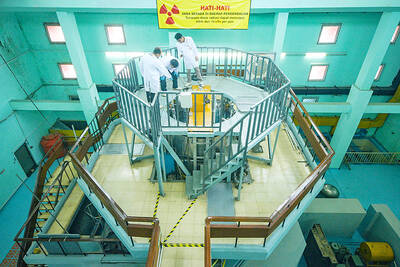The Nigerian extremist group Boko Haram is intensifying its attacks in neighboring Cameroon, targeting new villages with increasingly sophisticated weapons, as the army fears more violence in the approaching dry season.
“We’re convinced that the establishment of a ‘caliphate’ [by Boko Haram] is aimed not only at Nigeria, but also at Cameroon,” said Leopold Nlate Ebale, commander for an elite battalion in the border zone.
Boko Haram leader Abubakar Shekau has said he wants to set up a Nigerian caliphate — recalling the actions of the Islamic State militant group, which has taken over parts of Iraq and Syria.
Until recently, Boko Haram had focused its attacks on several Cameroonian border posts across from towns it controls in the Nigerian state of Borno. It has also been using Cameroon as a place to rest and stock up with arms and food. However, its attacks are now spreading further south into the country.
Members of the group have slit the throats of market-goers in broad daylight near the northern city of Mokolo, according to Cameroon’s army.
Meanwhile, rivers between the west African nations are evaporating as the dry season approaches.
Dry weather “will increase Boko Haram’s capacity for harm,” said colonel Jacob Kodji, a regional army chief in northern Cameroon. “They will no longer have to cross over bridges. They will be able to cross anywhere over the border, at any time, by any means.”
The Islamists have taken about 20 towns in Nigeria and amassed a weapons stockpile seized from Nigerian army bases.
They now use armored vehicles and landmines, as well as Kalashnikovs and rocket launchers.
Cameroon’s military is increasingly concerned as Boko Haram fighters approach major cities like Maroua, the capital of the Far North region, which the group is suspected of infiltrating.
Cameroon has deployed about 2,000 soldiers in the northern region and registered 32 deaths since the start of the operation.
Despite the losses, the government says its soldiers are beating back the Islamists.
The authorities regularly announce the killing of hundreds of Islamists during skirmishes, though it is impossible to verify the figures.
Cameroon has about 4,000 elite soldiers, trained by Israeli soldiers, but observers are skeptical about the capabilities of the regular army, particularly in the face of bigger attacks.
“Until now, the military presence has endured major skirmishes, but if Boko Haram decided to launch a major offensive, they could break through Cameroon’s lines without too much difficulty,” said a source close to the country’s intelligence services, requesting anonymity.
The army’s successes up to now were partly due to the fact that the insurgents were sending young, inexperienced recruits to Cameroon, rather than hardened fighters from Nigeria, he said.
“The Boko Haram fighters we’re dealing with are trained in three weeks: The first week, they’re given money and drugs, the second week they learn to put together and strip down a Kalashnikov and the third, they’re sent to the frontline,” a Cameroonian officer said, declining to be named.
The army, initially criticized for its inaction, also feels increasingly isolated in its fight against the Islamist group.
Hundreds of Nigerian soldiers have fled to Cameroon on several occasions in response to Boko Haram attacks, yet the two countries “share information, but nothing more,” Cameroon’s defense ministry said.

Four people jailed in the landmark Hong Kong national security trial of "47 democrats" accused of conspiracy to commit subversion were freed today after more than four years behind bars, the second group to be released in a month. Among those freed was long-time political and LGBTQ activist Jimmy Sham (岑子杰), who also led one of Hong Kong’s largest pro-democracy groups, the Civil Human Rights Front, which disbanded in 2021. "Let me spend some time with my family," Sham said after arriving at his home in the Kowloon district of Jordan. "I don’t know how to plan ahead because, to me, it feels

Poland is set to hold a presidential runoff election today between two candidates offering starkly different visions for the country’s future. The winner would succeed Polish President Andrzej Duda, a conservative who is finishing his second and final term. The outcome would determine whether Poland embraces a nationalist populist trajectory or pivots more fully toward liberal, pro-European policies. An exit poll by Ipsos would be released when polls close today at 9pm local time, with a margin of error of plus or minus 2 percentage points. Final results are expected tomorrow. Whoever wins can be expected to either help or hinder the

North Korea has detained another official over last week’s failed launch of a warship, which damaged the naval destroyer, state media reported yesterday. Pyongyang announced “a serious accident” at Wednesday last week’s launch ceremony, which crushed sections of the bottom of the new destroyer. North Korean leader Kim Jong-un called the mishap a “criminal act caused by absolute carelessness.” Ri Hyong-son, vice department director of the Munitions Industry Department of the Party Central Committee, was summoned and detained on Sunday, the Korean Central News Agency (KCNA) reported. He was “greatly responsible for the occurrence of the serious accident,” it said. Ri is the fourth person

SKEPTICAL: Given the challenges, which include waste disposal and potential domestic opposition, experts warn that the 2032 nuclear timeline is overambitious Indonesia is hoping going nuclear can help it meet soaring energy demand while taming emissions, but faces serious challenges to its goal of a first small modular reactor by 2032. Its first experiment with nuclear energy dates to February 1965, when then-Indonesian president Sukarno inaugurated a test reactor. Sixty years later, Southeast Asia’s largest economy has three research reactors, but no nuclear power plants for electricity. Abundant reserves of polluting coal have so far met the enormous archipelago’s energy needs, but “nuclear will be necessary to constrain the rise of and eventually reduce emissions,” said Philip Andrews-Speed, a senior research fellow at the